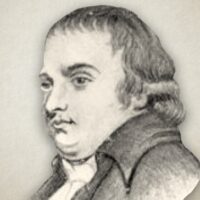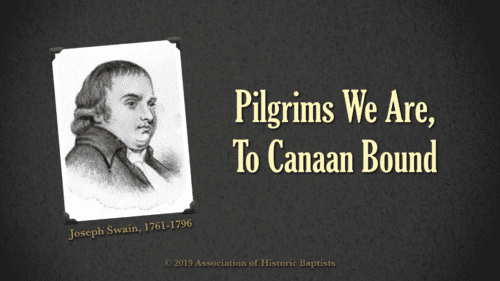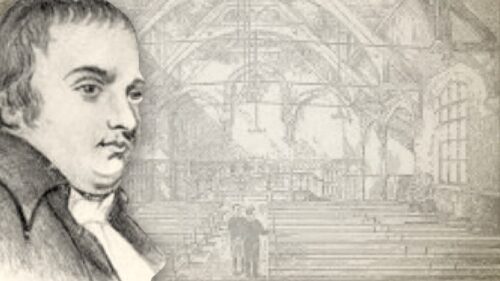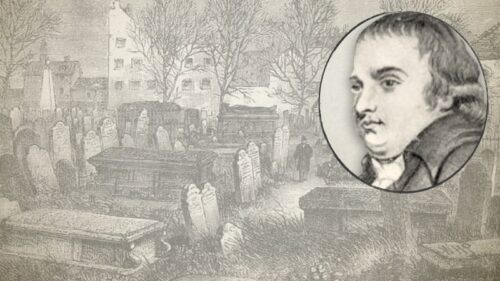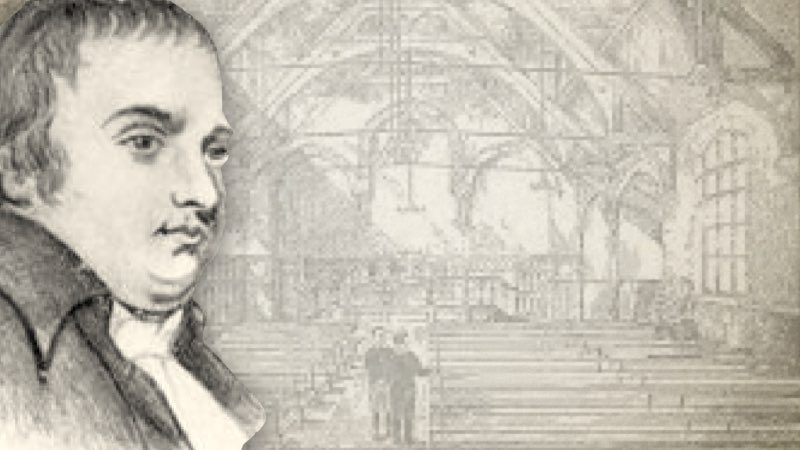
The Life And Ministry Of Joseph Swain
John Gadsby, “Memoirs Of The Principal Hymn-Writers And Compilers Of The 17th, 18th and 19th Centuries”:
Joseph Swain was born in Birmingham in 1761. His parents died when he was very young. At an early age he was apprenticed to an engraver. On removing to London, he became acquainted with a number of gay youths, who were extremely fond of plays and dancing, and, being naturally of a cheerful disposition, his company was much sought after. At this time he composed some songs and plays. But he was not allowed to proceed beyond the prescribed line. One day it was suggested to his mind that he was on the road to eternal death. He therefore purchased a Bible. His convictions of sin increased, and his conscience became greatly alarmed with apprehensions of eternal ruin. In his Diary of April 2nd, 1782, he describes the state of his mind: “I was followed, for about six months, with dreadful ideas of eternal torments, fearing lest by fire or sickness I might be removed into the endless fire of hell. Still I found that I loved my sins, and was not able to give them up, though I feared the punishment due to them.” After a time, and after many legal workings, and various attempts to make his own peace with God, he felt his heart gradually melted. Many scriptures were brought to his mind, wherein he not only saw himself as a sinner, but Christ as a Saviour, yea, as his Saviour. “Yea,” he says, “I saw and believed that he died for me, and that I should soon be with him in glory. O how did my enraptured soul rejoice, at that time, in this great salvation! So great was the peace and satisfaction of my mind that I thought I could bear to he confined in the darkest dungeon, provided I might feel there what I then felt of the presence of God in my soul. But ah! the heavenly vision was not of long continuance, as I soon found by experience. The heavenly scene was snatched away, leaving but the remembrance of it, except that in my heart I felt an aching void that Christ only could fill.” He now began to write some hymns. As he was singing one of them, a person who overheard him asked him whose it was, and when he found it was his own, he invited him to go to chapel with him; but it is impossible to describe the surprise and delight he experienced on hearing from the pulpit the very things which he had himself gone through, for this was the first gospel sermon he had ever heard. He said, “I am sure what the preacher said is true, for he has described my feelings better than I can myself.” He afterwards went to hear Rippon, and was baptized by him in May, 1783. After hearing a sermon preached by John Berridge, he said to his wife, “My dear, I do think I shall die with joy.” Some time afterwards he was called by the church to the work of the ministry, and in June, 1791, went to preach for a people who met in East Street, Walworth, London, and who, without being formed into a church, had gone on for 11 years, having had no stated minister over them. In Dec, a church was formed, and Swain was made the pastor. When the church was first formed, there were only 27 members, but the number soon increased to 200. The chapel was enlarged three times. But Swain’s labors soon terminated, as he died April 14th, 1796. Swain wrote, in a letter to a friend, an account of his experience, from which I extract the following:
“Dear Brother in Christ,—
Though I see not your face,
Your name is engraved on my heart;
And oft with delight I contemplate the place
Where soon we shall meet not to part.
“But O to that grace which has saved us from hell,
What debtors we have been and are.
We must be content, if the whole we would tell,
To wait till we both arrive there.
“Yet though I am conscious the height of God’s love,
And depths of his wisdom and grace,
Will never be known till we sing them above,
I cannot but aim at his praise.
“Though high is the theme, and the ransom’d in heaven
To reach it exert all their skill;
For one to be silent whose sins are forgiven
Is surely more difficult still.
“Look back, then, my soul, and by mercy constrain’d,
Declare what thy Saviour has done,
When first over Satan and sin he obtain’d
That conquest which proved thee his own.
“A slave to the passions which fetter mankind,
And mark them as servants of sin,
And yet to self-righteousness strongly inclined,
My heart was both proud and unclean.
“But thoughts of eternity oft would intrude,
And conscience on judgment would muse;
How must I of God with abhorrence be view’d,
While thus all his gifts I abuse.
“Till secret alarms in the season of sleep
Disturb’d and prevented my rest,
By pointing my fears to the bottomless deep,
My envy to seats of the blest.
“‘Twas then with reluctance I purchased the book
Where God’s righteous will is reveal’d,
Intending but seldom within it to look,
My eyes to its worth being seal’d.
“But while I was seeking on his holy day
Behold the long-suffering of God!
Unhallowed delight in perusing a play,
The Bible my purpose withstood.
“This pierced through my soul like a two-edged sword,
And laid my heart open to view
I felt both the truth and the power of the word;
My sins were intended, I knew.
“I trembled to think of his all-seeing eyes,
Which watched me through all my career;
And thought on the day when the dead must arise;
With horror akin to despair.
“That word which bold infidels dare to dispute,
Which God did in mercy inspire,
I found like an axe which is kid to the root,
To cut down a tree for the fire.
“The precepts demanding obedience I read,
Overwhelm’d with confusion and shame;
The threat’nings like thunder roll’d over my head,
And darted like lightnings their flame.
“But neither the danger of hell I was in,
Nor dread of displeasure divine,
Could turn from the love or the practice of sin
A heart so rebellious as mine.”
Joseph Swain (1761-1796) was a Strict and Particular Baptist preacher and hymn-writer. In 1792, he was appointed pastor of the Baptist church meeting on East Street, Walworth, a position he held until his death.



